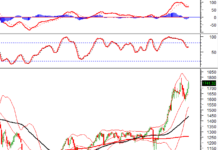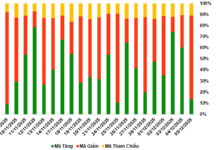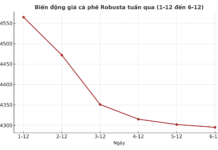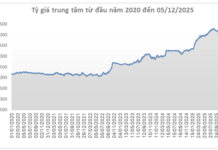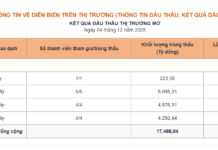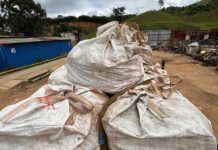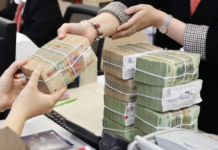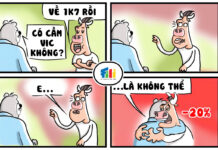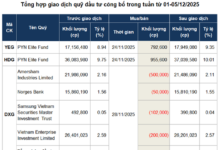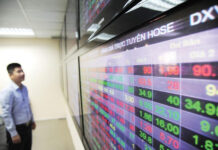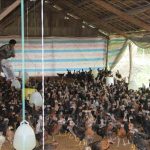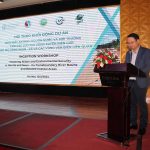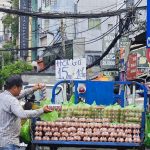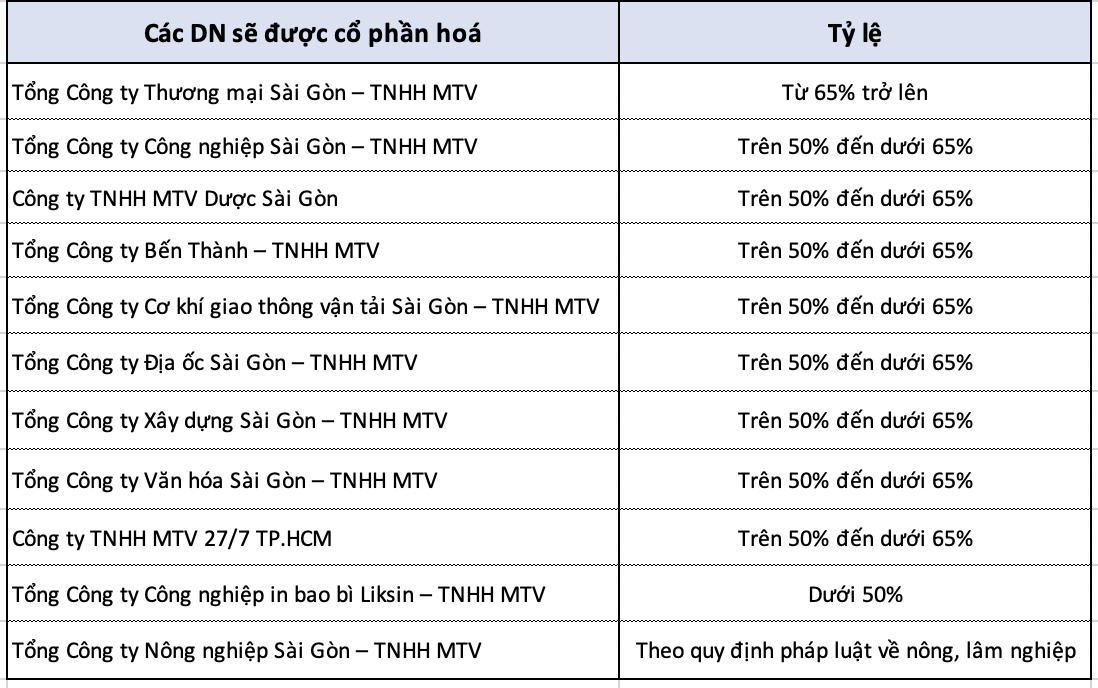A key aspect of the collaboration agreement between BAF and Muyuan is the transfer of smart livestock farming technology. The company states that in the 4.0 era, the application of advanced technologies, automation, digital transformation, and artificial intelligence in livestock farming not only enhances production efficiency and optimizes resources but also ensures biosecurity and environmental standards on a global scale.
By partnering with Muyuan, BAF aims to comprehensively improve its closed-loop system, from feed mills to pig housing models. With Muyuan’s extensive experience and successful implementation of biosecurity measures in China, BAF will learn and effectively apply these practices in Vietnam. This will help mitigate disease risks, protect the health of the pig herd, improve business efficiency, and ensure a stable supply for the market.
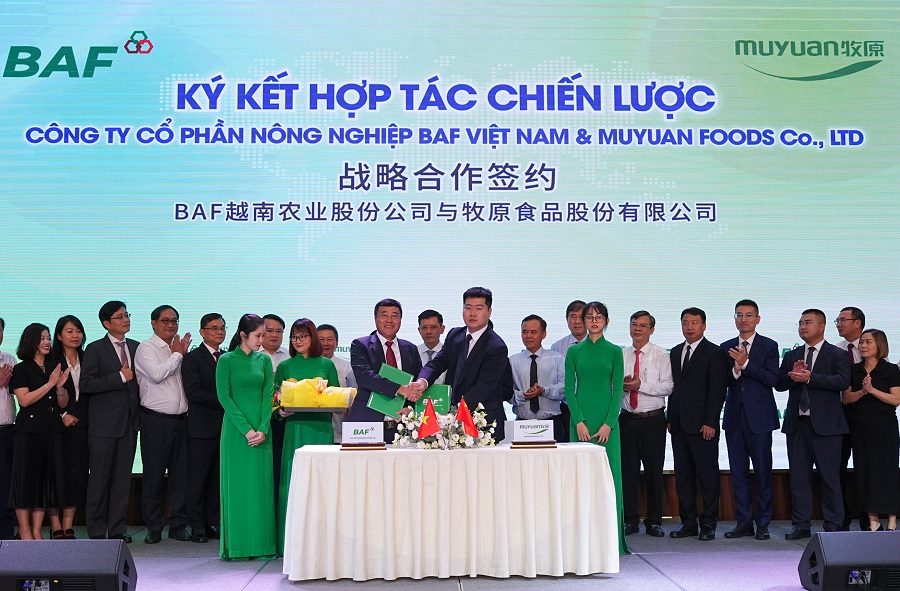 Signing ceremony between BAF and Muyuan Group
|
Moreover, the practical development of the livestock industry has a significant environmental impact, from water resource usage to greenhouse gas emissions. However, according to BAF, the modern technologies transferred from Muyuan will enhance waste management processes, recycle resources efficiently, and reduce negative environmental impacts. This promotes circular economic development and lays a solid foundation for sustainability goals, which are currently a global priority for businesses and organizations.
“Muyuan is confident in supporting BAF in achieving its expansion goals of 450,000 sows and 10 million market hogs by 2030. We believe that through this collaboration, we can provide Vietnamese consumers with fresh, delicious, and safe food while driving the prosperity and development of Vietnam’s pig industry, creating a greener, healthier environment, and a more prosperous society,” said Mr. Gao Tong, CFO of Muyuan Group.
Mr. Truong Sy Ba, Chairman of BAF’s Board of Directors, also shared, “The cooperation between BAF and Muyuan marks the beginning of a different journey in the future. We aim to go beyond technology transfer in pig housing and biosecurity and environmental solutions. We will continue to expand our collaboration in various fields to promote the modern and innovative development of the livestock industry.”
New pig housing technology enables an ambitious target of 10 million commercial pigs by 2030
According to the disclosed information, one of the most important technologies that Muyuan will transfer to BAF is multi-story pig housing.
Mr. Gao Tong shared that this model has been applied in China for a long time, and each floor serves a specific purpose. A six-story pig house is designed, with the fifth and sixth floors dedicated to breeding sows, the third and fourth floors for farrowing and weaning pigs, and the bottom two floors for raising commercial pigs. This design facilitates efficient management, especially in terms of biosecurity.
Muyuan’s pig houses also feature advanced emissions treatment technology. According to the company representative, the system has four layers of filters to ensure that the air meets ICU standards before being released into the pig house. The airflow is precisely calculated and adjusted to meet the pigs’ needs. Subsequently, the air inside the house is accumulated and passed through another system for further treatment, ensuring thorough disinfection before being released into the environment.
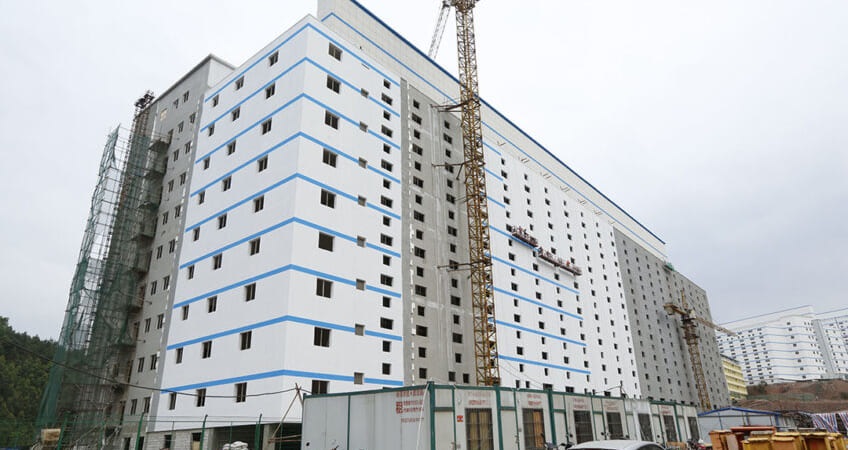
A pig house in China
|
“Muyuan has numerous farms scattered across China, and our odor control technology always meets the standards, even in residential areas,” said the company representative.
More importantly, the multi-story design offers significant advantages, allowing Mr. Truong Sy Ba to envision even more ambitious goals. During the event, Mr. Ba shared that BAF’s target for 2030 has been raised from 6 million to 10 million commercial pigs, along with 450,000 sows.
“This is a highly ambitious and challenging goal. However, in the context of the rampant African swine fever, it poses a challenge to food security. If companies like us do not step up and expand, the pig population will be unable to control the disease, leading to a shortage in supply and potentially driving up the price of pork to 100,000 VND/kg,” he added.
“We have decided to turn the African swine fever challenge into an opportunity. In reality, no one wants a disease outbreak, but now that it’s here, we have no choice but to face it head-on,” Mr. Ba continued.
Mr. Ba shared that this elevated target was set after initiating the cooperation with Muyuan.
“Muyuan’s technology brings numerous advantages. Firstly, it significantly reduces farming costs. Secondly, it minimizes land usage. Compared to traditional single-story buildings, Muyuan’s multi-story design reduces land costs by 50-70%. Additionally, their system includes filters to ensure biosecurity, and as their representative mentioned, the odor is effectively treated to eliminate any unpleasant smells,” he explained.
“Based on these factors, our collaboration is a strategic move and a turning point for BAF’s future development. Being a pioneer in adopting this technology gives us a competitive edge. Currently, our biggest competitors are not the industry giants but rather the small-scale farmers. As small-scale farming decreases, we can capture their market share,” Mr. Ba asserted.
According to Mr. Ba, to achieve this ambitious target, BAF will need to construct pig houses capable of accommodating 1.5-1.8 million pigs annually in the following years. This equates to building 11-12 farms similar to the Hai Dang complex (Tay Ninh province, with a capacity of 5,000 sows and 60,000 commercial pigs).
“Currently, BAF has several large-scale farms like Hai Dang (Tay Ninh, already operational), Hai Ha (Quang Ninh, about to commence operations), and Giai Xuan (expected construction by the end of 2024). Each of these farms can supply 130-150 thousand commercial pigs per year. To meet our target, we need to build 11-12 more complexes of this scale,” he elaborated.
A farm complex like Hai Dang is built on approximately 50 hectares of land. However, with the multi-story design, only 25 hectares are utilized, meaning that the same land area can accommodate two farms with double the production capacity.
“Initially, we were apprehensive about protecting our herd, but Muyuan’s strict biosecurity protocols and cost-effective farming practices gave us the confidence to expand our scale to 10 million pigs. Additionally, the reduced land requirement, along with the support of international financial institutions, provides us with the necessary resources to achieve this vision,” Mr. Ba concluded.
|
Muyuan Group, headquartered in Nanyang City, Henan Province, was established in 1992. Over the past 30 years, it has formed an integrated livestock industry chain encompassing feed processing, pig farming, slaughtering, and meat processing. The company’s main products include commercial pigs, breeding pigs, piglets, and pork. Muyuan Group boasts total assets of 210 billion yuan (29.4 billion USD) and employs 140,000 people. Its subsidiary, Muyuan Foods Co., Ltd., owns pig farms distributed across 218 counties in 104 cities and 24 provinces/autonomous regions in China. In 2023, Muyuan supplied nearly 64 million pigs to the market, ranking first globally. |
Chau An
Profiting Poultry Farmers: Riding the Wave of Rising Meat Prices
From the beginning of July 2024, poultry farmers in the province of Tra Vinh, Vietnam, have been reaping good profits thanks to a rise in the price of chicken and duck meat. The prices of these meats have increased by VND 5,000 to 10,000 per kg compared to the previous month, June 2024. This price hike has brought a welcome boost to the local poultry industry, with farmers seeing improved returns on their investments.
Vietnam and Laos collaborate to enhance water source security in the Mã and Nuen river basins
The project “Enhancing water security and environmental protection for the Ma and Nuen-Ca river basins and related coastal areas in Vietnam and Laos” is funded by the Global Environment Facility (GEF) with a budget of $8 million and will be implemented from 2024 to 2028. The project will benefit the following provinces: Hoa Binh, Nghe An, Thanh Hoa, Ha Tinh, Son La, Dien Bien in Vietnam; Xiengkhouang and Houaphan in Laos…

